What Do We Do With Classics That Are Racist?
Well, Peter Kuper decided to adapt one.

I can’t remember the last time I sat down and read an entire book in one sitting. This graphic novel had me enthralled from start to finish. Kuper keeps everything valuable about Conrad’s original work, but doesn’t provide a platform for Conrad’s racism.
I loved that Kuper covered criticisms of Heart of Darkness in the intro, even mentioning an African post-colonial writer who may have been Conrad’s greatest critic-Chinua Achebe. In fact, Achebe’s final paragraph in Things Fall Apart might be read as a sassy little zing at Conrad, who he believed to be an irredeemable racist.
I first read Heart of Darkness years ago when I started my M.A program in English Literature. Weirdly enough, I took several post-colonial courses, and never once had to read this for a post-colonial course. Instead this was assigned to me in one of my first literary criticism courses. In that class we also read Beloved (amazing book) and one of my favorite gothic short stories The Yellow Wallpaper. It was an eclectic course. I had never heard of Joseph Conrad or Heart of Darkness and like the broke bitch I was, I didn’t buy the textbook. I read the book on wattpad. (A good deal of classic public domain works can be found on wattpad or project gutenburg. Work smarter, not harder, kids. Don’t buy textbooks 
Also my comments from 2017 are still on the wattpad version of this story XD
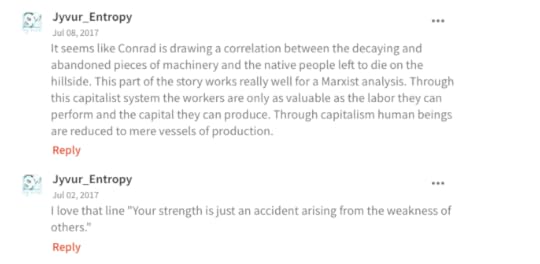
And yes, I did employ a Marxist criticism of the story. The assignment actually called for the thesis to be a combination fo two literary theories, so I did Marxist and deconstructionist.
Also like…I was legitimately a Marxist in 2017. *cringe!* I knowwwww….Had a copy of The Communist Manifesto and everything. So now, when my edgy liberal friends try to bring back over to the red side, y’all have really got to bring a persuasive argument. Because “capitalism exploits people” is a song and dance I used to perform myself. What I need at this point is some explanation of why socialism wouldn’t be exploitative. How you gonna convince me with a bunch of arguments I used to make myself? I need your socialist A-game to even entertain that discussion.
But like, moving on..
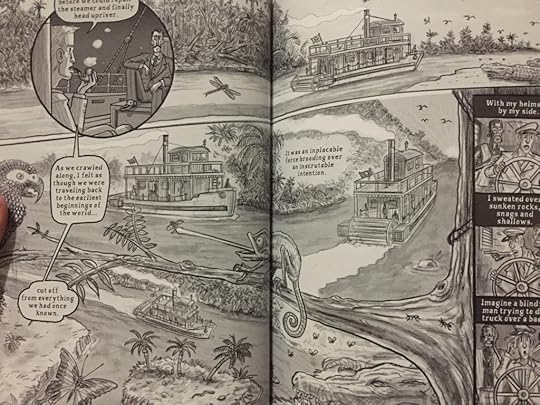
Is Heart of Darkness racist? Well, yeah, yes it is. It was written by a white conolozier in the 19th century. Dude was racist.
Does that make the book not worthy of reading? That’s a complicated question.
Because (as Kuper points out in his introduction) while Heart of Darkness was racist, it also brought attention to the absolute atrocities being committed in the Congo in a way that hadn’t been done before. He writes in gruesome and vivd detail about the violence done to the native people and sums it up in two words, delivered by Kurtz on his deathbed. “The horror! The horror!”
In Conrad’s original work, the African people become part of that horror. Africa itself is the “heart of darkness”-a primordial setting of savagery and brutality. The colonists are presented as the brutal and evil ones, but the African people are still dehumanized. Conrad writes about them as if they are wild animals. They gnash their teeth and their limbs reach out from tangled vines, like ethereal monsters crawling out of the night. And he calls one of the native Africans who works with him “an improved specimen” and then compares him to a dog in breeches walking on his hind-legs. It’s really egregious.
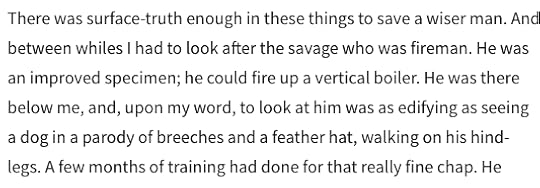
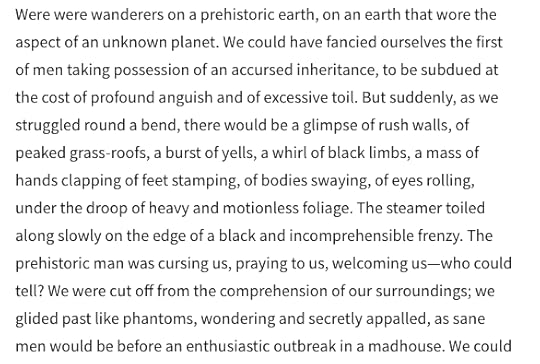
All of this mystery and menace around the African people adds a layer of atmosphere, but at what cost? The African people are so completely otherized that the meat of Conrad’s anti-colonial (or at least anti-colonization-in-its-most-brutal-forms) message may be lost, especially to modern audiences.
What Kuper has done is reimagined Conrad’s classic work, minus the racism, dehumanization, and otherization.
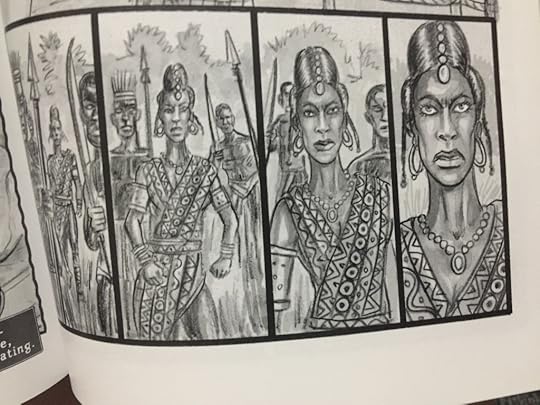
Some might call this sanitizing a racist text for modern consumption. But I’d argue that since Kuper fully admits the problems with the original text in the intro, he is preserving that history, and not absolving Conrad of any of his sins. He reimagines this classic text in a way that is more respectful of the African people. And hey, now we have an anti-colonial text that is far more respectful of the victims of imperialism. I think that’s a little better than just reprinting the original text so that a new generation could be influenced by Conrad’s racism. Does that mean nobody should ever read Conrad’s original text? Of course not. But there is value in reconsidering classic texts, and this graphic novel adaptation of ‘Heart of Darkness’ is more than an adaptation: it is a reconsideration of the text. It is an active grappling with the most problematic aspects of Heart of Darkness.
We can appreciate the vivid depiction of the brutality-because it was important for European audiences to know exactly what was happening in Africa. It was important to remove that distance from the supposed “savages”-to make audiences see all of the evil being committed by their own supposedly “civilized” society. Because what kind of civilized person allows men to starve while working his ship? What kind of civilized person puts the heads of native “rebels” on spikes outside his door? What sort of civilized person uses human bodies up like factory parts, leaving them to languish and die, sprawled on the grass alongside broken and rusting machines.
There was no “civilizing” aspect of colonialism. Only abject violence.
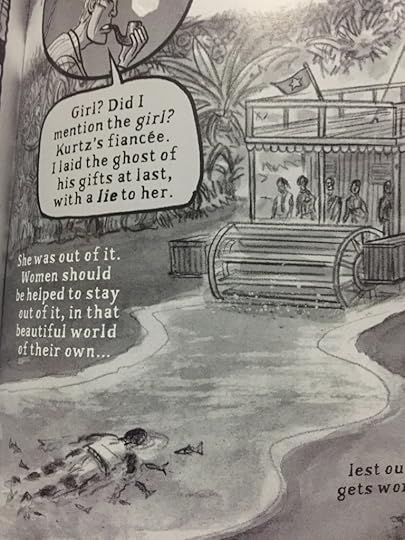
“The horror! The horror!”
European audiences needed to see that horror and Conrad, as someone who had traveled to the Congo and seen all of this horror firsthand, was the perfect person to make them see it. He was a flawed man living in the 1800s. He did not write respectfully about the native people. That is not okay. But to act like there’s no value in a text that so radically condemned the evil being committed in the name of capitalism, the human lives being used up like springs in a machine, it simply makes no sense. It’s throwing the baby out with the bathwater.
The metaphor of the decaying machinery in the grass alongside the sick and starving African people was the one that I found most impactful in Conrad’s original text. It was what I based the bulk of my thesis on. Kuper adapts this portion of the text by using only drawing. There is none of Conrad’s original text regarding this scene.
Let’s compare the original with the adaptation.
Here is Conrad’s original work:
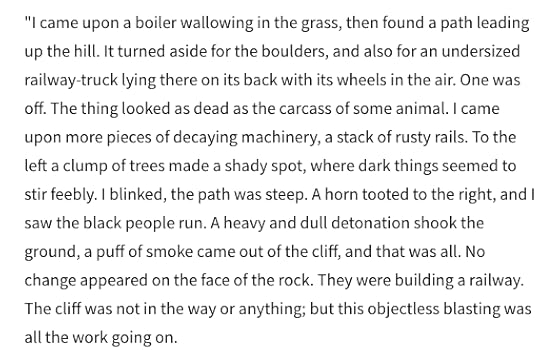
Then there is a scene of the narrator stumbling upon a chain gang. Then some description as Marlow continues walking, a description of a big hole that has been dug and the surrounding area, and then the following paragraph.
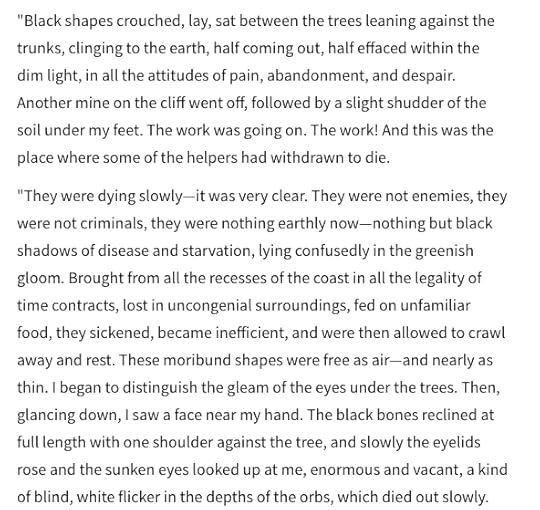
So we have here a powerful comparison of the discarded boiler and the discarded, dying human beings.
Kuper handles this portion of the text in a different way. Here is his adaptation:
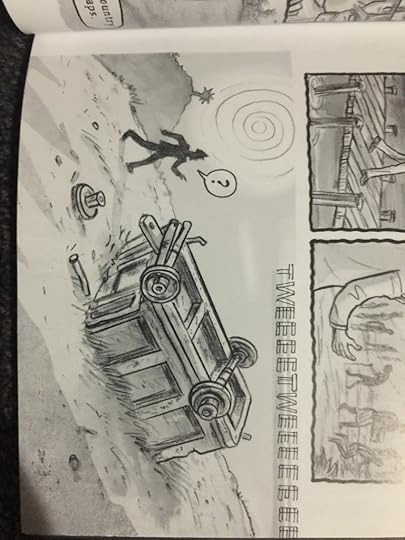
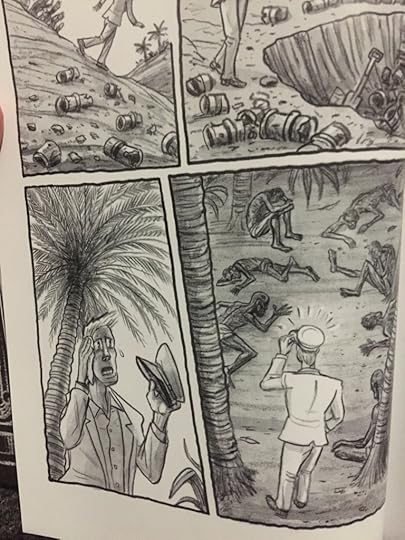
He opts to use all visuals for this section and it’s a choice that emphasizes the absolute horror of it, horror that no words could ever truly describe. My only criticism would be that there is a cartoonish element that at times underscores the seriousness of the content. Some drawings are incredibly bleak, but others have cartoonish over-the-top facial expressions and classic comic strip style that feel out of place. It doesn’t ruin the effect entirely, but it does undermine it enough so that it is noticeable.
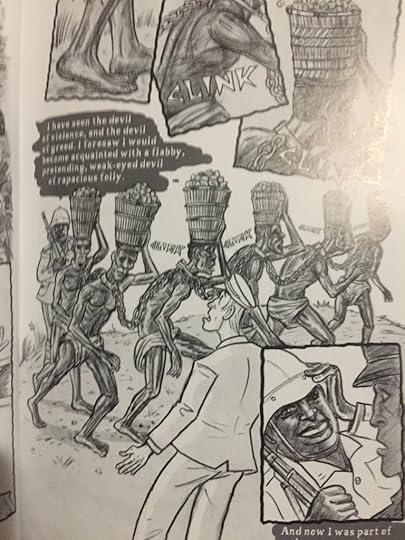
Pages like the one above use visuals to truly evoke an emotional response and underscore the macabre and disturbing reality of colonialism.
This graphic novel illuminated the most fundamental aspects of Conrad’s work without bringing Conrad’s racism to life in a new form. Yet by addressing the problematic aspects in the intro, he also doesn’t sanitize the text or excuse Conrad.
And wow, the artwork on the page with the novel’s most iconic line: “The horror! The horror!”
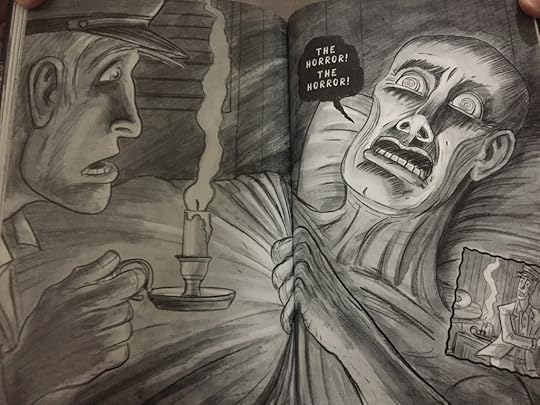
What I believe Kurtz is referring to is horror at his own cruelty and debased actions. He has a heart of darkness and on his deathbed, be must come to terms with the evil that he has committed.
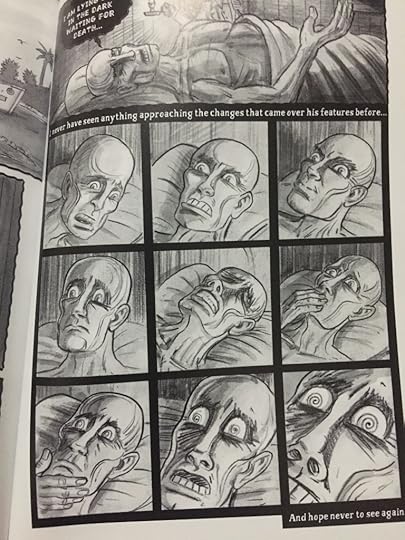
Are adaptations the answer to classic works with problematic elements that, although rightfully odious to a modern audience, were the norm for their time?
I’d say it could be one of many answers. I don’t think we can read Heart of Darkness without addressing the text’s most problematic elements. But we can see the historical and cultural value in such a work, while also admitting its failings.
Then again, for those who find the book unreadable, I don’t blame you.
I think the answer of what to do with problematic classics is something that every reader must answer for themselves. Is Heart of Darkness worth reading or adapting?
I’m gonna go full post-modernism and say, it’s subjective. There is no right answer. I find value in a work that was fundamental in beginning the outrage against colonialism, and I believe I can admit that value while also condemning the racist and sexist portions of the text.
Then again, if you can’t be fucked to pick up a book that relies on racist caricatures to defend the African people, that makes sense too.




